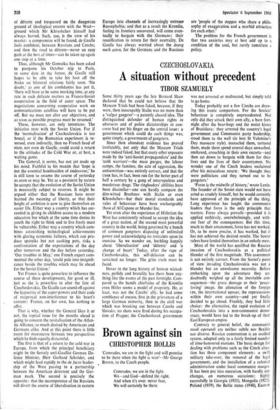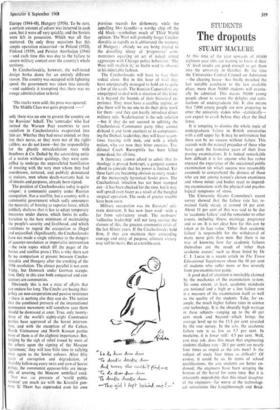A situation without precedent
CZECHOSLOVAKIA TIBOR SZAMUELY
Some thirty years ago the late Bernard Shaw declared that he could not believe that the Moscow Trials had been faked, because, if they were, then inescapably Stalin was no more than a 'vulgar gangster'—a patently absurd idea. The distinguished defender of human rights in abstracto and of police dictatorships in con- creto had put his finger on the central issue; a government which could do such things was, quite simply, a government of gangsters.
Since then abundant evidence has proved irrefutably, not only that the MoscoW Trials were indeed faked, but that every other exposure made by the 'anti-Soviet propagandists' and the 'cold warriors'—the mass purges, the labour camps, the famines, the acts of aggression, the antisemitism—was entirely correct, and that the USSR has, in fact, been run for the better part of half a century by a gang of unscrupulous and murderous thugs. The ringleaders' abilities have been dissimilar—one can hardly compare the dim-witted Brezhnev with Stalin or even Khrushchev—but their moral standards and rules of behaviour have been unchangeably those of Al Capone or Murder Inc.
Yet even after the experience of Hitlerism the West has consistently refused to accept the idea of a great nation, of the second most powerful country in the world, being governed by a bunch of common gangsters disposing of unlimited power and acknowledging no restraints upon its exercise. So we wander on, burbling happily about 'liberalisation' and 'detente' and 'a change of heart.' Today, after the rape of Czechoslovakia, this self-delusion can be sustained no longer. The grim truth must be faced.
Never in the long history of human wicked- ness, perfidy and brutality has there been any- thing like the events of the past fortnight. Com- pared to the bandit chieftains of the Kremlin even Hitler seems a model of propriety. He, at least, was not the Czechs' ally; he had some semblance of excuse, first in _the grievances of a large German minority, then in the civil war which was breaking out between Czechs and Slovaks; no shots were fired during his occupa- tion of Prague; the Czechoslovak government was not arrested or maltreated, but simply told to go home.
Today probably not a few Czechs are draw- ing this ironic comparison. For the Soviets' behaviour is completely unprecedented. Not only did they attack their own ally, a bare fort- night after the bear-hugs and the moist kisses of Bratislava : they arrested the country's legal government and Communist party leadership, stood them to the wall (in best St Valentine's Day massacre style), manacled them, tortured them, made them spend several days unwashed, unshaved, crouching in their own excreta—and then sat down to bargain with them for their lives and the lives of their countrymen. No wonder one of the Czech leaders exclaimed after his miraculous return : 'We thought they were politicians and they turned out to be gangsters.'
'Force is the midwife of history,' wrote Lenin. The founder of the Soviet state would not have acted as crudely himself, but he would certainly have approved of the principle of the thing. Long experience has taught the communist leaders that force is the only principle that matters. Force always prevails—provided it is applied ruthlessly, overwhelmingly, and with- out fear of the consequences. But this time, much to their amazement, force has not worked. Or, to be more precise, it has worked, but it has not achieved the desired results. The Soviet rulers have landed themselves in an unholy mess.
Most of the world has qualified the Russian invasion of Czechoslovakia as a political blunder of the first magnitude. This assessment is not entirely correct. From the Soviet's point of view invading Czechoslovakia was not a blunder but an unwelcome necessity. Before embarking upon the adventure they un- doubtedly weighed up all the inevitable con- sequences—the grave damage to their 'peace- loving' image, the alienation of the foreign CPS, the international uproar, the repercussions within their own country—and yet finally decided to go ahead. Frankly, they had little choice: the alternative, the rapid evolution of Czechoslovakia into a non-communist demo- cracy, would have led to the break-up of their East European empire.
Contrary to general belief, the communist modi operandi are neither subtle nor flexible nor diverse. Russian communism is an ossified system, adapted only to a fairly limited number of time-honoured motions. The basic design for dealing with problems such as the Czech situa- tion has three component elements: a swift military take-over, the removal of the legal government, and the installation of a colonial administration under, local communist stooges. It has been put into execution, with hardly any changes, on numerous occasions: highly sucessfully in Georgia (1921), Mongolia (1922), Poland (1939), the Baltic states (1940), Eastern Europe (1944-48), Hungary (1956). To be sure, a certain amount of odium was incurred in each case, but it wore off very quickly, and the Soviets were left in possession. Which was all that mattered. On only three occasions has this simple operation miscarried—in Poland (1920), Finland (1939), and Persian Azerbaijan (1946) —and each time this was due to the failure to secure military control over the country's whole territory.
In Czechoslovakia, however, the well-tested design broke down for an entirely different reason. The country was occupied with lightning speed, the government was taken into custody —and suddenly it transpired that there was no stooge administration to hand.
`The stocks were sold; the press was squared; The Middle Class was quite prepared —'
only there was no one to govern the country_on the Russians' behalf. The 'comrades' who had
invited the Warsaw Pact countries to save socialism in Czechoslovakia evaporated into thin air. Whether they had never existed, or they lost their nerve, or they were not of the right- calibre, we do not know—but the responsibility for the ghastly miscalculation rests with Brezhnev & Co. Defied by the astonishing unity
of a nation without quislings, they were com- pelled to undergo the unparalleled humiliation
of treating with the very men whom they had overthrown, tortured, and publicly denounced as traitors, men whose death-warrants had, to all intents and purposes, already been signed.
The position of Czechoslovakia today is quite unique: a communist country under Russian occupation.' Not a satellite, but a country with a communist government which sadly announces the necessity of bowing to superior force, which publicly declares that it has to adopt temporary measures under duress, which limits its colla- boration to the bare minimum of maintaining the people's security and livelihood, and which continues to regard the occupation as illegal and unjustified. (Significantly, the Czechoslovaks have not made a single reference to the dangers of counter-revolution or imperialist intervention —the twin topics which fill the pages of the Soviet and satellite press.) This is why there can be no comparison at present between Czecho- slovakia and Hungary after the crushing of the 1956 revolution. The closest parallel is not even Vichy, but Denmark under German occupa- tion. Only in this case both conquered and con- querors are communists.
Obviously this is not a state of affairs that can endure for long. The Czechs are basing their policy on non-cooperation and passive resistance —there is nothing else they can do. The notion that the combined pressure of the international communist movement will somehow save them should be dismissed at once. True, only twenty- three of the world's eighty-eight Communist parties have approved of the Soviet interven- tion, and with the exception of the Cuban, North Vietnamese and North Korean parties none of them is of the slightest importance. But, Judging by the sigh of relief issued by most of the others upon the signing of the Moscow 'agreement: they will lose little time in rallying once again to the Soviet colours. Aftei fifty years of corruption and degradation, of slavishly following every twist and turn of Soviet policy, the communist apparatchiks are incap- able of severing the Moscow umbilical cord.
Nor will tne pressure of 'world public opinion' cut much ice with the Kremlin gun- men. U Thant has superseded even his own previous records for dishonesty, while the appalling Mrs Gandhi—a worthy chip off the old block—symbolises much of Tfiird World
opinion. The West will probably forget Czecho- slovakia as rapidly as it obliterated the memory
of Hungary : already we are being treated to the drivelling idiocy of 'progressive' com- mentators equating an act of naked armed aggression with Chicago police behaviour. The West will swallow it,' as Stalin used to observe in his inimitable fashion.
The Czechoslovaks will have to face their ordeal alone. But in this hour of trial they have unexpectedly managed to hold on to quite a few of the cards. The Russian Capomafiosi are unequipped to deal with a situation of this kind; it is beyond the bounds of their historical ex- perience. They must have a satellite regime, or else there will be no one to do their dirty work for them—and they can hardly introduce direct military rule. `Kadarisation' is the sole solution --but if they do not succeed in splitting the Czechoslovak Communist party (they cannot disband it and form another) or in compromis- ing the Dubcek leadership, they will have to con- tinue treating with men, and with a whole nation, who are now their bitter enemies. Tra- ditional Czech Russophilia has been killed stone-dead, for all time.
A theocracy cannot afford to admit that its theology is proved bankrupt, a gangster cannot afford to concede that his power is limited. Yet these facts are becoming obvious to every reader of the increasingly hysterical Soviet press. The Czechoslovak infection has not been stamped out—it has been checked for the time, but it may well spread even faster as a result of the bungled surgical operation. The seeds of greater trouble have been sown.
Military occupation was the Russians' ulti- mate deterrent. It has now been used—with a far from satisfactory result. The mobsters' `collective leadership' will not long survive the stresses of this, the greatest communist crisis of the last fifteen years. If the Czechoslovaks hold firm, if they can maintain their astounding courage and unity of purpose, ultimate victory may still be theirs. But at a terrible cost.







































 Previous page
Previous page